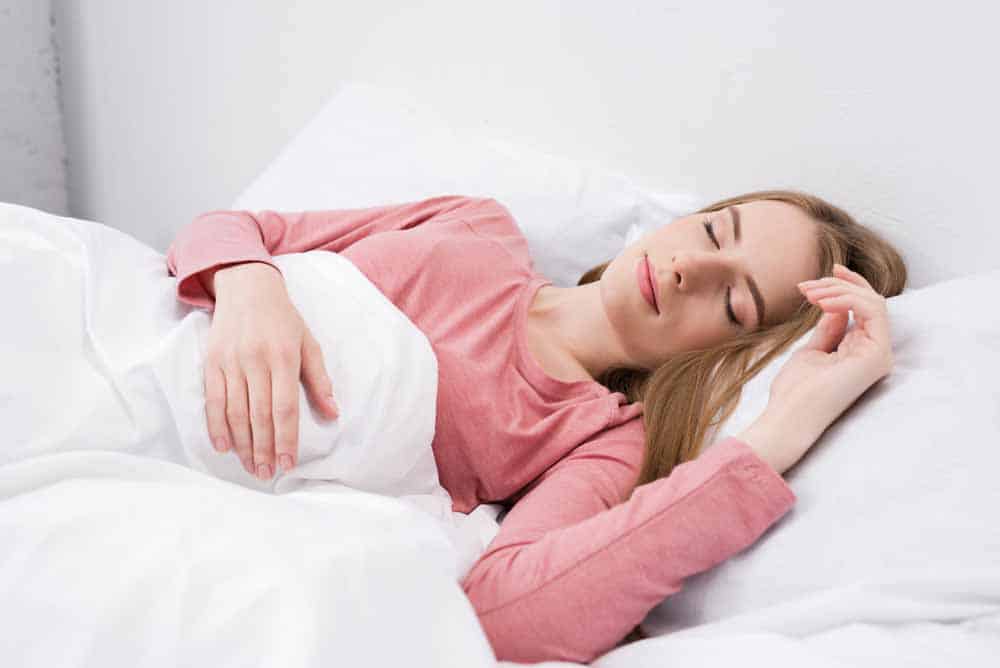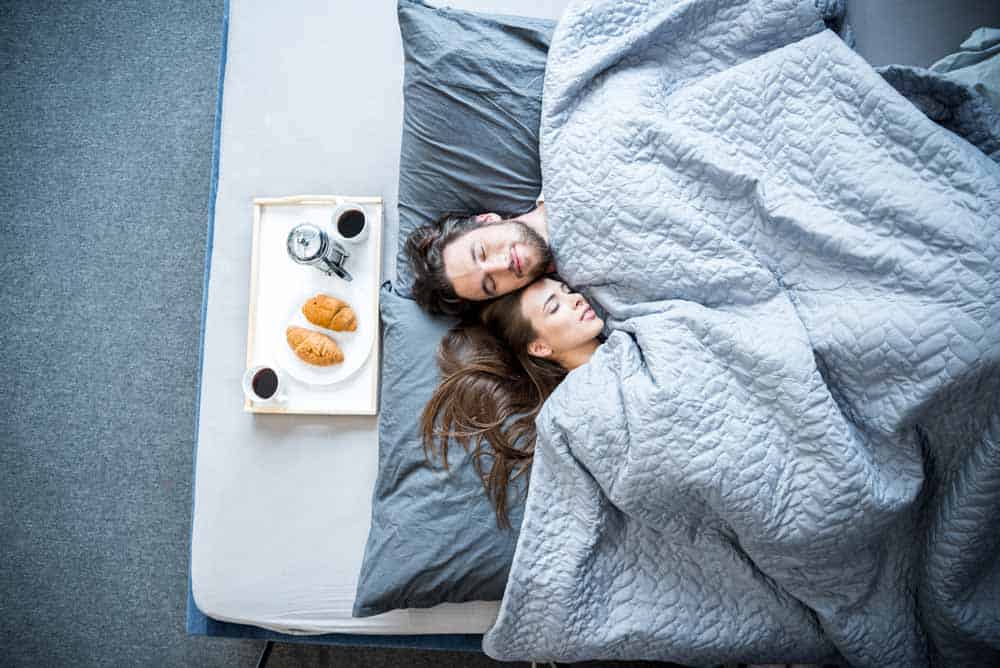
How to sleep better at night? Many people strive to sleep seven to eight hours a day, but do the length of your slumber matters?
You could be sleeping for eight hours but wake up with a bad back due to a bad night. Or, you could find yourself waking up stressed and tired. While sleep quantity matters, in the end it’s all about sleep quality.
Integrating healthy sleep habits can make all the difference. It’ll help individuals maximize the hours they spend on sleeping with optimal quality that can help them wake up refreshed and rejuvenated. So, here’s what you need to know to sleep better at night.
Sleep quantity
Sleep quantity refers to the number of sleeping hours a person needs. For adults, it’s recommended to have around seven to nine hours of slumber, while the young ones need about 10 to 14 hours of shut-eye. The amount of sleep needed is dependent on a lot of factors – age, lifestyle, health, etc.
Sleep quantity is different among individuals. Our summary below shows the number of sleep one needs when they grow old and how to sleep better at night.
Newborns
Babies need a lot of sleep. Newborns, in general, should sleep approximately around 14 to 17 hours a day, because their bodies are still growing. But, can babies sleep lower than that? Doctors will still find it alright if a newborn sleeps not less than 13 hours. However, parents should take note that newborns should not go beyond 18 hours of sleep per day.
12 to 18 months
When a baby turns one year old, the amount of sleep hours changes slightly for them. An average of 11 to 13 hours is needed for them to grow healthy and strong. Also they need a total of four hours of nap per day.
2 years old
At this age, children are curious and energetic. If they can stand and walk, parents are in for a run! With that energy, two-year old children need about 11 to 12 hours of slumber every night. Other than that, they need an hour or two of afternoon naps per day.
3 to 5 years old
Toddlers are an energetic bunch of children! Do you know to teach them how to sleep better at night? Moreover, this is the time when parents prepare them for school. Ten to 13 hours of sleep every night is necessary for them to continue learning and discovering about the world.
6 to 13 years old
Grade school and middle school studs need 9 to 12 hours of sleep to get through their classes and everyday life. Year by year, they’ll be facing strenuous work and lifestyle choices, thus, needing that sought-after rest they require after school.
14 to 17 years old
Teenage years can be a fickle matter. It’s the time where your children get to be in groups, school activities, or late-night hangouts. In this generation, technology also reigns in their lives. So, how can you make your teen get enough sleep? At their age, they need 8 to 10 hours of sleep every night.
Sleep quality
Sleep quality is all about how well you sleep. Good sleep quality means sleeping soundly with little to no awakenings at night. And if you do, you get back to sleep in less than 20 minutes. Sleep quality is also about falling asleep within 30 minutes and feeling refreshed on the next day.
Meanwhile, bad sleep quality can be characterized by insomnia, frequent night awakenings, and fatigue upon waking up. Even if you have been sleeping for 8 hours, but have woken up tired and cranky because of frequent awakenings, you’re not getting any good sleep.
Sleep quality can be difficult to know or measure. Talking to a doctor on how to sleep better at night can help curb the issue.

Factors that affect sleep quality
So, what are the factors affecting sleep quality? Our evenings surely can’t be that perfect. There will be times when we toss and turn at nights when we can’t sleep. What’s the underlying cause for it?
Age
As we grow older, our health and responsibilities pile up. With age, we grow with aches, pains, and worries. These issues can stack and cause restless nights. Illness is one factor we get when we grow older. For people with dementia and Alzheimer’s, sleep is a problem due to “Sundowning.”
Medications
Medications for anti-depressants often lead to insomnia or frequent awakenings. That’s because the purpose of the drug is to make you happy or giddy – it promotes alertness. That sentiment and feeling can often make one fully awake with adrenaline.
Retirement
Retirees will have more downtime and napping activities that it can affect their sleep-wake cycle. They’re also known to live a sedentary lifestyle now that they’re off from work and ruin their rhythm on how to sleep better at night. However, this less active lifestyle can put off their circadian rhythm. Their passiveness can induce melatonin (the hormone responsible for sleep) during the day that may lead to insomnia at nights.
Food and drinks
Excessive food before bedtime may lead to insomnia, gastritis, heartburn, and obstructive sleep apnea. The two can affect your sleep quality through the difficulty of falling asleep or repeatedly waking up at night.
Illness, disease, and medical conditions
Medical conditions are known to affect your sleep. What’s more, conditions like lower back pain, migraines, arthritis, and restless legs syndrome can make it hard to get a good shut-eye.
Sleep environment
Is it noisy outside? Is your room cluttered? Does your laptop or mobile phone keep you awake at night? Your sleep environment can be a culprit, too!

How to sleep better at night
A good night’s sleep can improve your mental and physical health greatly. A lack of rest can throw off your hormones and can take a serious toll on your productivity, mood, and weight. A lot of individuals are struggling to get the sleep they need, but it often seems like an impossible goal to achieve.
If you want to sleep better at night, heed these sleep hygiene and rituals!
Watch what you’re eating
Eating heavily at night can induce insomnia. At best, you should stop eating two to three hours before bedtime. Avoid food that may cause indigestion such as red meats, spicy foods, and big desserts. If you find your stomach rumbling at night, snack on light food such as fruits and biscuits.
Avoid caffeinated drinks and stimulants
Caffeine keeps you awake, so avoid caffeinated drinks for four to six hours before going to sleep. Likewise, alcohol can increase awakenings and decrease sleep quality at nighttime. Similarly, one should refrain from smoking too close to sleeping time because it inhibits how to sleep better at night.
Get your daily dose of Vitamin D
Getting some sunshine can balance your circadian rhythm. Lighting can play a huge role in your sleep. Sunlight can promote alertness and suppresses the melatonin hormone, thus, making you awake during the daytime. If you’re feeling sleepy, take a walk or move your desk a little bit closer to the window.
Change your sleep environment
Your sleep environment, a.k.a., the bedroom, itself can put a strain on your sleep. Is your room disorganized? You know what they say, “A messy room is a messy mind.” If your room is disorganized it can create tension and worries. You might not know it, but having too many items in sight can disturb you. Clean and organize your bedroom for a worry-free sleep!
Keep electronics away
The blue light emitting from your gadgets suppresses melatonin and keeps you awake 20 minutes more, according to studies. When you’re in the bedroom, turn off all notifications from work and avoid glancing on your emails as much as you can. Shut your electronics off at least 30 minutes before bedtime. What’s more, keep your mobiles away at least 14 inches from your face.
Maintain and invest in quality bed products
Your bed might be the culprit on how to sleep better at night! Is the mattress soggy? Is the frame creaky? Are your pillows making your head itchy? Invest in quality products at Solace Sleep for a good night’s sleep. We have a collection of mattresses, bed frames, and adjustable beds that will improve sleep quality by reducing lower back pain, lumbar, and spine stiffness.
Exercise regularly
Exercising in the morning can increase alertness which stimulates our energy. Our happy hormones, as well as, adrenaline and epinephrine, pump up the day and prepare our bodies for sleeping at night. According to PubMed, exercise can reduce insomnia, anxiety, and night awakenings.
Instill bedtime routines
Bedtime routines are pre-sleep habits that you can instill to help you relax and prepare for sleep. Relaxation techniques include taking a hot bath, reading a book, meditating, drinking tea, or listening to soft music.
Keep regular sleep-wake cycles
Being consistent with your sleeping hours can improve sleep quality in the long run. Irregular hours can set off your circadian rhythm and hormones. Not to mention, it’ll compromise your metabolism, which left untreated, may lead to obesity. If you’re struggling with waking up in the morning, set an alarm before going to bed.
Keep naps short and early
Power naps are shown to boost brain function and productivity. However, naps taking more than 20 minutes and done late in the afternoon can have detrimental effects on how to sleep better at night.



